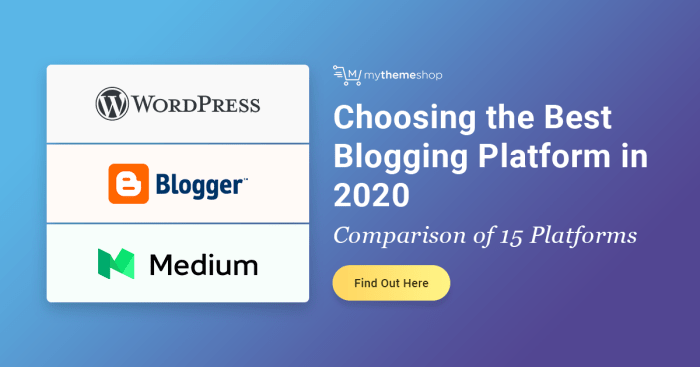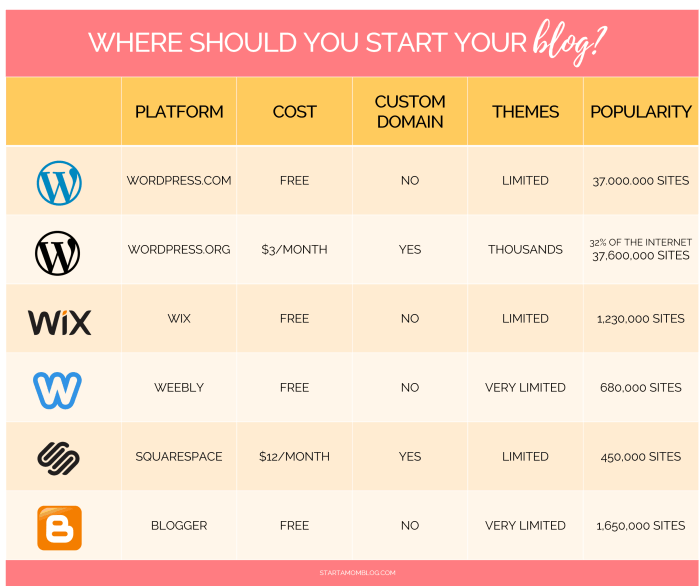Best Blogging Platforms takes center stage, calling all digital pioneers to explore the vast landscape of online creativity and expression. Get ready to dive into a world where words hold power and ideas reign supreme.
From the basics of blogging platforms to the intricate details of customization and monetization, this guide will equip you with the tools needed to make your mark in the digital realm.
Introduction to Blogging Platforms
Blogging platforms are online tools or software that allow individuals to create and manage their own blogs. These platforms play a significant role in the online world by providing users with a platform to share their thoughts, ideas, and content with a global audience.
Main Features of Effective Blogging Platforms
- Easy-to-use interface for creating and publishing content
- Customizable themes and layouts to reflect personal style
- Integration with social media for easy sharing
- tools to help improve visibility and reach
- Analytics to track and analyze blog performance
Different Types of Blogging Platforms
- Self-hosted platforms like WordPress.org for full control over customization
- Hosted platforms like WordPress.com for ease of use and maintenance
- Microblogging platforms like Tumblr for short-form content
- Social media platforms like Medium for a built-in audience
Popular Blogging Platforms
When it comes to choosing a platform for your blog, there are several popular options to consider. Let’s take a look at some of the best-known blogging platforms in the market and compare their features, pricing, and user-friendliness.
WordPress
WordPress is one of the most widely used blogging platforms, known for its flexibility and customization options. It offers a range of themes and plugins to enhance your blog’s functionality. While the basic version is free, there are additional costs for premium themes and plugins. WordPress is popular among bloggers for its ease of use and extensive community support.
Blogger, Best Blogging Platforms
Blogger is a free platform owned by Google, making it easy to integrate with other Google services like AdSense. It offers a simple interface and basic customization options, making it ideal for beginners. However, it may lack some of the advanced features found in other platforms. Blogger is popular for its straightforward setup process and seamless integration with Google services.
Medium
Medium is a blogging platform that focuses on quality content and storytelling. It has a clean and minimalist design, with a built-in audience of readers looking for engaging articles. While anyone can publish on Medium for free, there is a membership program that allows readers to access exclusive content. Medium is popular for its emphasis on writing quality and its engaged community.
Overall, these platforms offer different features and cater to various needs, whether you’re looking for customization options, simplicity, or a focus on quality content. Each platform has its own strengths and weaknesses, so it’s important to consider your goals and preferences when choosing the right platform for your blog.
Customization and Design Options

When it comes to creating a unique blog that stands out from the crowd, customization and design options play a crucial role. Let’s dive into the various platforms and their offerings in this department.
WordPress
- WordPress offers a wide range of themes and templates that can be customized to fit your style and brand.
- Users can also utilize plugins to add extra design elements and functionality to their blogs.
- The platform allows for CSS customization for those with coding skills looking to make more advanced changes.
Blogger, Best Blogging Platforms
- Blogger provides a selection of customizable templates that can be tweaked to match your aesthetic preferences.
- Users can also modify the HTML and CSS of their blog for more intricate design alterations.
- The platform offers the ability to add gadgets and widgets for added customization.
Squarespace
- Squarespace offers a variety of pre-designed templates that can be easily customized through their drag-and-drop interface.
- Users can adjust colors, fonts, layouts, and more to create a visually appealing blog.
- The platform also allows for custom CSS for those looking to fine-tune their design further.
Design Importance
Design plays a critical role in attracting and retaining readers to your blog. A visually appealing and user-friendly design can enhance the overall reading experience and make your content more engaging. It’s essential to create a cohesive and aesthetically pleasing design that reflects your brand and content to keep your audience coming back for more.
Monetization Opportunities
In the world of blogging, monetization is a key aspect for many content creators looking to turn their passion into a source of income. Let’s explore the different ways bloggers can monetize their content on various platforms and compare the various options available.
Ads
- Many blogging platforms offer the option to display ads on your site, allowing you to earn money based on clicks or impressions.
- Popular ad networks like Google AdSense or Media.net can be integrated into your blog to start generating revenue.
- Strategically placing ads within your content can help increase click-through rates and maximize earnings.
Affiliate Marketing
- Affiliate marketing involves promoting products or services and earning a commission for every sale made through your referral link.
- Bloggers can partner with companies and promote their products organically within their content.
- Affiliate marketing can be a lucrative monetization strategy for bloggers with a loyal audience and a niche focus.
Sponsored Content
- Working with brands to create sponsored posts or reviews can be a profitable way to monetize your blog.
- Brands pay bloggers to feature their products or services in a way that aligns with the blogger’s content and audience.
- Transparency is key when it comes to sponsored content, as readers appreciate honesty and authenticity.
Selling Products
- Many bloggers create and sell their own products, such as e-books, courses, merchandise, or digital downloads.
- Having a loyal audience can greatly benefit bloggers looking to sell their products, as repeat customers can drive revenue.
- Utilizing platforms like Shopify or Etsy can help bloggers set up online stores and reach a larger customer base.
Analytics and Tools: Best Blogging Platforms

Analytics and tools are essential for bloggers to track the performance of their blogs and improve visibility on search engines. These tools provide valuable insights into website traffic, user behavior, rankings, and more.
Google Analytics
Google Analytics is a popular analytics tool that provides detailed statistics about website traffic, sources, user engagement, and conversion rates. It helps bloggers understand their audience, identify popular content, and track the effectiveness of marketing campaigns.
- Track website traffic and user behavior
- Identify top-performing content and s
- Measure conversion rates and goal completions
Google Analytics is a powerful tool that can help bloggers make data-driven decisions to optimize their content and improve user experience.
Yoast
Yoast is a widely used plugin that helps bloggers optimize their content for search engines. It offers features like content analysis, optimization, meta tags management, and XML sitemap generation to improve website visibility and ranking on search engine results pages (SERPs).
- Optimize content for target s
- Analyze readability and -friendliness of content
- Generate XML sitemaps for search engine indexing
Yoast is a valuable tool for bloggers to enhance their on-page and increase organic traffic to their websites.
